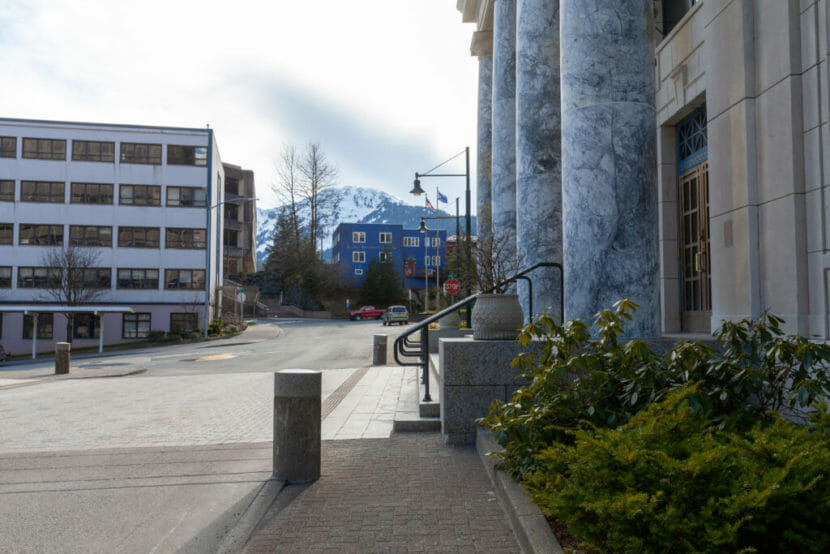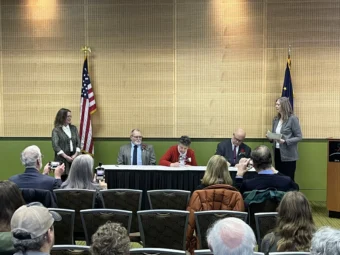
The field of candidates in Alaska’s Aug. 16 primary became clearer on Wednesday, the filing deadline.
Democratic Senate Minority Leader Tom Begich announced he wouldn’t run for re-election. His aide Löki Tobin is running instead. Begich’s announcement follows Republican Senate President Peter Micciche’s announcement that he wasn’t running, so both Senate caucuses will have new top leaders next year.
The Senate races that featured prominent candidates from both parties included the East Anchorage seat currently held by Republican Sen. Mia Costello, who faces Democratic Rep. Matt Claman. And in Fairbanks, Democratic Sen. Scott Kawasaki faces a challenge from Republican Fairbanks Mayor Jim Matherly.
Other Senate races will largely be fought within a party, such as an Eagle River Senate race that includes only four Republicans and an Anchorage Senate race for a heavily Democratic seat that includes three Democrats and one Republican.
Juneau Democratic Sen. Jesse Kiehl was the only senator without an opponent. Golovin Democratic Sen. Donny Olson is the only legislator who doesn’t have to run for re-election due to redistricting. The Senate currently has 13 Republicans and seven Democrats.
In the House, there were multiple candidates in 34 of the 40 races. The House currently has 21 Republicans, 15 Democrats and four independents, but two of the Republicans caucus with the Democrats and independents. When the caucus formed, House Speaker Louise Stutes, a Kodiak Republican, cited majority caucus support for programs that benefit her constituents, as well as the unwillingness of some Republicans to compromise, while Eagle River Rep. Kelly Merrick cited the inability of the House to organize and the need to work across party lines in a closely divided chamber.
Unlike in previous years, the limited number of candidates in legislative races means that the primary will not narrow the field, except in the case of one Alaska House race.
There will be many races in which more than one candidate from one party will advance to the general election. There are eight Senate races with multiple Republican candidates and one Senate race with multiple Democratic candidates, as well as 19 House races with multiple Republicans and five House races with multiple Democrats.
In the past, only one candidate from each party would have advanced from the primary election into the general election. But a new election system is in effect this year as a result of Ballot Measure 2 passing in 2020. Under the new system, the top four candidates in each primary race, regardless of party, advance to the general election, in which voters will rank their choices.
House District 35, which includes Chena Ridge and other areas near Fairbanks, is the only race with more than four candidates, with five people running. If they all remain in the race, one candidate will be eliminated in the primary election.
Since the other 58 legislative races have no more than four candidates, everyone on the primary ballot in those races will appear on the ranked-choice general election ballot, unless they withdraw. Supporters of the system say it means that a limited number of primary voters will no longer determine the outcome of elections.
In the primary election, voters will choose one candidate in each race. In the general election in November, they will rank the top four candidates. The outcome will be determined by the candidate preferred by most voters, or the candidate with the most votes once all of the trailing candidates have been eliminated.
There are 10 candidates for governor: Republican Gov. Mike Dunleavy, Democrat Les Gara, Republican David Haeg, Alaskan Independence Party candidate John Wayne Howe, Republican state Rep. Christopher Kurka, independent candidate William Nemec II, Republican Charlie Pierce, Libertarian Billy Toien, Republican Bruce Walden and independent Bill Walker.
There are 20 candidates for U.S. Senate, including Republican Sen. Lisa Murkowski and Republican Party-endorsed challenger Kelly Tshibaka.
The U.S. House race drew 31 candidates, 24 of whom also are among the 48 candidates in the special primary election on June 11.
Candidates have until June 25 to withdraw from the primary.



